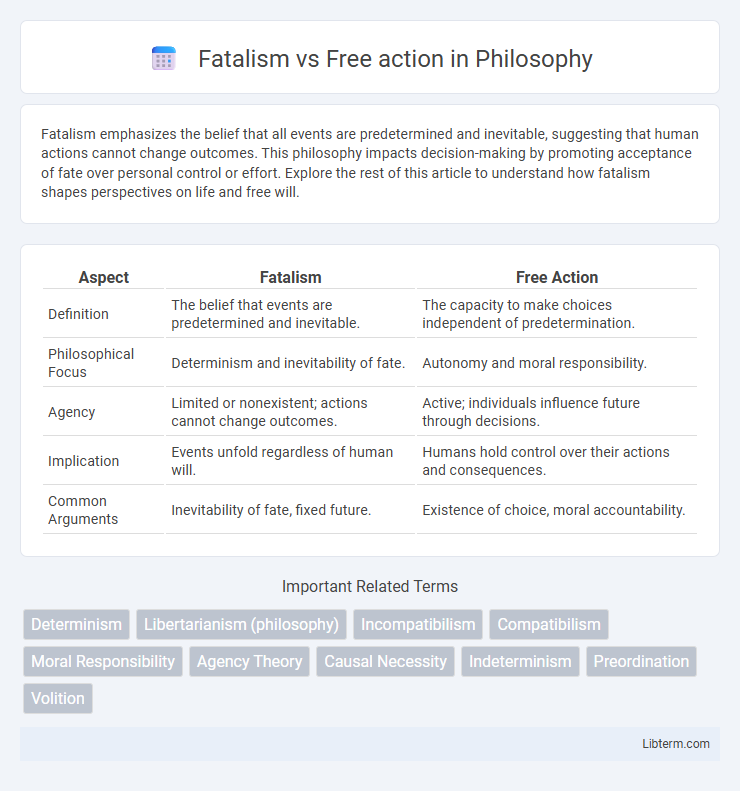Fatalism emphasizes the belief that all events are predetermined and inevitable, suggesting that human actions cannot change outcomes. This philosophy impacts decision-making by promoting acceptance of fate over personal control or effort. Explore the rest of this article to understand how fatalism shapes perspectives on life and free will.
Table of Comparison
| Aspect | Fatalism | Free Action |
|---|---|---|
| Definition | The belief that events are predetermined and inevitable. | The capacity to make choices independent of predetermination. |
| Philosophical Focus | Determinism and inevitability of fate. | Autonomy and moral responsibility. |
| Agency | Limited or nonexistent; actions cannot change outcomes. | Active; individuals influence future through decisions. |
| Implication | Events unfold regardless of human will. | Humans hold control over their actions and consequences. |
| Common Arguments | Inevitability of fate, fixed future. | Existence of choice, moral accountability. |
Understanding Fatalism: Core Concepts
Fatalism is the philosophical doctrine asserting that all events are predetermined and inevitable, rendering human efforts to change outcomes futile. It emphasizes a fixed cosmic order where free will appears illusory, challenging the concept of moral responsibility. Understanding fatalism involves examining key ideas such as determinism, inevitability, and the limits of autonomous action within a preordained framework.
Defining Free Action: The Basics
Free action refers to the ability of individuals to make choices that are not predetermined by external forces or fate, emphasizing autonomy and self-determination. It involves intentional decision-making where agents exercise control over their actions, reflecting genuine freedom rather than mere illusion. Understanding free action requires examining the conditions under which choices are considered voluntary, including awareness, rational deliberation, and the absence of coercion.
Historical Perspectives: Fatalism and Free Will
Ancient Stoicism advocated fatalism, emphasizing the inevitability of fate governing human life, while Aristotle championed free will, asserting rational agency shapes moral responsibility. Medieval theologians like Augustine reconciled divine omniscience with free action, influencing later philosophical discourse on predestination versus human freedom. The Enlightenment further advanced the debate, with thinkers such as Kant emphasizing autonomy and moral accountability despite deterministic frameworks.
Philosophical Arguments for Fatalism
Philosophical arguments for fatalism often hinge on the principle of the excluded middle and the inevitability of future truths, asserting that every proposition about the future is either true or false, thereby predetermining events. This view is supported by logical determinism, which claims that if the future is already true in some sense, free action cannot alter predetermined outcomes. Notably, philosophers like Aristotle and Chrysippus contributed to early fatalistic thought, emphasizing the tension between necessity and human agency in ethical and metaphysical contexts.
Counterarguments: Advocates of Free Action
Advocates of free action argue that fatalism undermines moral responsibility by denying individuals the ability to choose their actions. They emphasize the concept of agent causation, where individuals are the originators of their decisions, not mere effects of predetermined events. Empirical studies in neuroscience and psychology suggest that conscious intention plays a critical role in decision-making, challenging fatalistic assertions that outcomes are fixed regardless of human effort.
Religions and the Fate vs. Free Will Debate
Many religions grapple with the tension between fatalism and free action, often framing human destiny as either predetermined by divine will or shaped through free will. In Christianity, theological perspectives vary from Calvinist predestination, emphasizing God's sovereign control over fate, to Arminianism, which upholds human free agency in salvation. Eastern religions like Hinduism and Buddhism embrace karma as a complex system balancing fate and individual action, influencing the ongoing philosophical debate on fate versus free will.
Fatalism in Modern Society
Fatalism in modern society often manifests through the belief that events are predetermined by external forces or fate, limiting individuals' sense of agency and responsibility. This perspective can influence attitudes toward social issues, mental health, and personal decision-making, sometimes leading to passivity or reduced motivation to enact change. Understanding the balance between fatalistic views and free action is crucial for fostering empowerment and resilience within contemporary cultural and psychological frameworks.
Psychological Impacts of Belief in Fate vs. Choice
Belief in fatalism often leads to increased feelings of helplessness and reduced motivation, as individuals perceive their actions as predetermined and beyond control. In contrast, embracing free action fosters a sense of agency, enhancing psychological resilience and promoting proactive behavior in goal pursuit. Studies in psychology reveal that perceived control over outcomes significantly correlates with improved mental health and reduced anxiety levels.
Real-World Implications: Decision Making and Responsibility
Fatalism challenges the concept of free will by implying that all events, including human decisions, are predetermined, which can diminish perceived personal accountability in real-world decision making. In contrast, embracing free action underscores individual responsibility, encouraging proactive choices and ethical behavior based on the belief that outcomes depend on one's decisions. These contrasting views significantly impact legal systems, moral accountability, and psychological motivation in societal contexts.
Striking a Balance: Coexistence of Fate and Freedom
Striking a balance between fatalism and free action involves recognizing that certain life events may be predetermined while individuals maintain the capacity for autonomous decisions. Philosophical frameworks such as compatibilism argue that free will exists within the constraints of fate, enabling purposeful human agency without denying causality. Empirical studies in psychology further support this coexistence by showing how belief in destiny cohabitates with personal responsibility, fostering adaptive coping mechanisms in complex decision-making processes.
Fatalism Infographic

 libterm.com
libterm.com